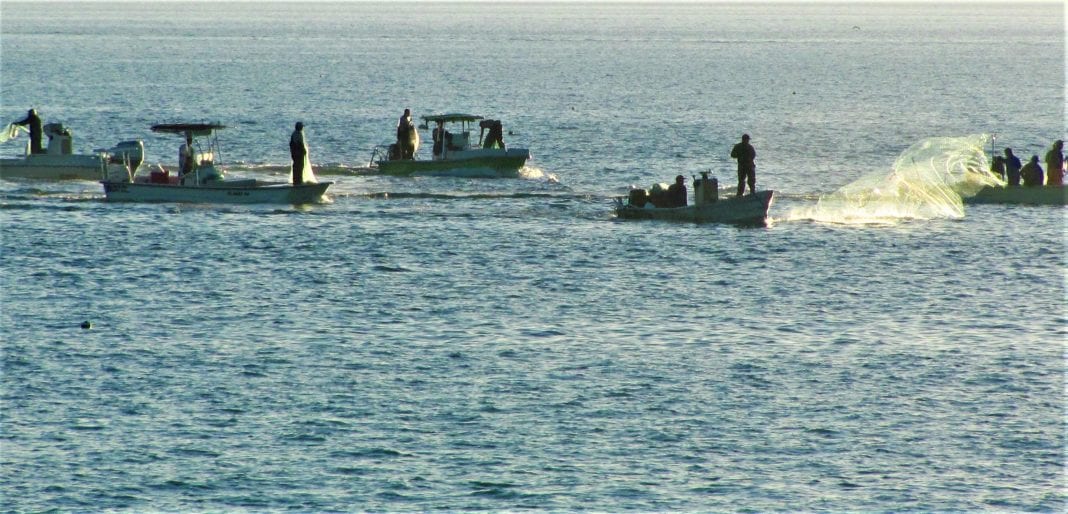

CORTEZ – Red tide, blue-green algae, global warming, sea rise, sewage spills and oil spills combined don’t antagonize commercial fishermen as much as one single, 25-year-old subject.
On election day in 1994, Florida voters passed a state constitutional amendment banning Florida commercial fishermen from using gill nets.
The law made any commercial fisherman in the state an outlaw who used a gill net to catch mullet, as fishing families had done for generations.
Since then, they have lived the words of Winston Churchill: “Never give in. Never give in. Never, never, never. In nothing, great or small, large or petty – never give in, except to convictions of honor and good sense. Never yield to force. Never yield to the apparently overwhelming might of the enemy.”
One “enemy” is the Florida Fish and Wildlife Conservation Commission (FWC), which has so much power it is not legally obligated to extend due process of law to fishermen, says Ronald Crum, a Panacea bait shop owner who has a pending lawsuit against the state agency.
Next week, the case is set to come before Florida Second Circuit Court Judge Kevin J. Carroll in Tallahassee.
If Crum wins, he says it could be the beginning of the end of the net ban.

“If we win in the state court, we should finally have due process. If we don’t – and the FWC has argued that we don’t – we go to federal court with court rulings and FWC arguments that we don’t have due process,” Crum said. “How do you think that will look to a federal judge – Americans without any right to due process under the United States Constitution? The judge could eviscerate the FWC.”
The issue in the case is whether the FWC’s authority is constitutional or statutory, he said, adding that he believes it is statutory and subject to court rulings, which provide checks and balances on the agency.
Previous cases have indicated the FWC is immune from judicial rulings, he said.
A 2012 case ended in a stalemate.
Crum, the Wakulla Commercial Fishermen’s Association and mullet fishermen Jonas Porter and Keith Ward sued the FWC, arguing that its rules enforcing the net ban violate the equal protection rights of commercial fishermen, and cause the unwanted bycatch the ban is designed to prevent.
Leon County Circuit Judge Jackie Fulford found in favor of the commercial fishermen and lifted the net ban, ruling it a “legal absurdity” that FWC rules enforcing the ban allow small stretch mesh nets that catch and kill juvenile fish while prohibiting the larger mesh nets that let juvenile fish survive to reproduce.
Her ruling was appealed and stayed by the Florida Attorney General’s office, then reinstated, then appealed and stayed again before being reversed by the First District Court of Appeal, whose ruling the plaintiffs challenged at the Florida Supreme Court in 2014.
The high court declined to accept jurisdiction, ending the appeals.
Cortez commercial fisherman Mark Coarsey, the former president of Fishing for Freedom’s Manatee County chapter, which disbanded in March, led the local group for five years, working on the case and in other ways to regain and preserve the rights of commercial fishermen.

For years, he demonstrated at the Cortez Commercial Fishing Festival how legal-size mullet were once caught in now-illegal gill nets, while mullet too small to be caught swam through the mesh, saving the resource, Coarsey said.
“Legal nets have lots of bycatch,” Crum said. “Ninety-eight fish die for every two that go to market due to the net ban.”
Last year, Coarsey appeared with several members of the group at a meeting of the Florida Constitution Revision Commission (CRC) in St. Petersburg, requesting that a proposed constitutional amendment be placed on the November 2018 ballot to reverse the gill net ban.
The CRC did not approve the amendment, leaving voters no opportunity to vote on the issue.
When the net ban went into effect in 1995, “I was 45 years old and looking for a job for the first time,” said James ‘Wyre’ Lee, of Cortez Bait and Seafood. “It was nasty.”
The nastiness, fishermen say, is that when scientific evidence of mullet overfishing was disputed, recreational fishing groups and environmentalists published a photograph of a dolphin in a net with the slogan, “Ban the Nets – Save Our Sealife,’’ the inference being that commercial fishermen commonly caught dolphins in gill nets.

The photograph “was staged by a Florida Marine Patrol officer who was busted” a decade later, says Cortezian Mark Taylor, former president of the Organized Fishermen of Florida, who lost his wholesale seafood trucking business after the net ban.
Voters were misled, he said. For example, they did not know that Cortez commercial fishermen pioneered habitat restoration in the state by drafting a proposal to use funds from gill net permit fees to pay for two full-time employees at the Florida Department of Environmental Protection.
“We were devastated because we couldn’t use our nets,” said Mary Fulford Green, 94, whose family was one of the founding families of Cortez.
“That’s when the price of fish became prohibitive for ordinary people to eat,” she said. “If you can afford a $1,500-a-week vacation rental, you can afford a $19.95 shrimp dinner. Ordinary people can’t afford that. People on Social Security can’t afford that.”
“People didn’t vote in ‘94 to hurt commercial fishermen,” Crum said. “They voted to limit gill net fishing, but it’s overkill.”